Nursing Ethics Question 2022
VerifiedAdded on 2022/10/11
|7
|2608
|10
AI Summary
Contribute Materials
Your contribution can guide someone’s learning journey. Share your
documents today.
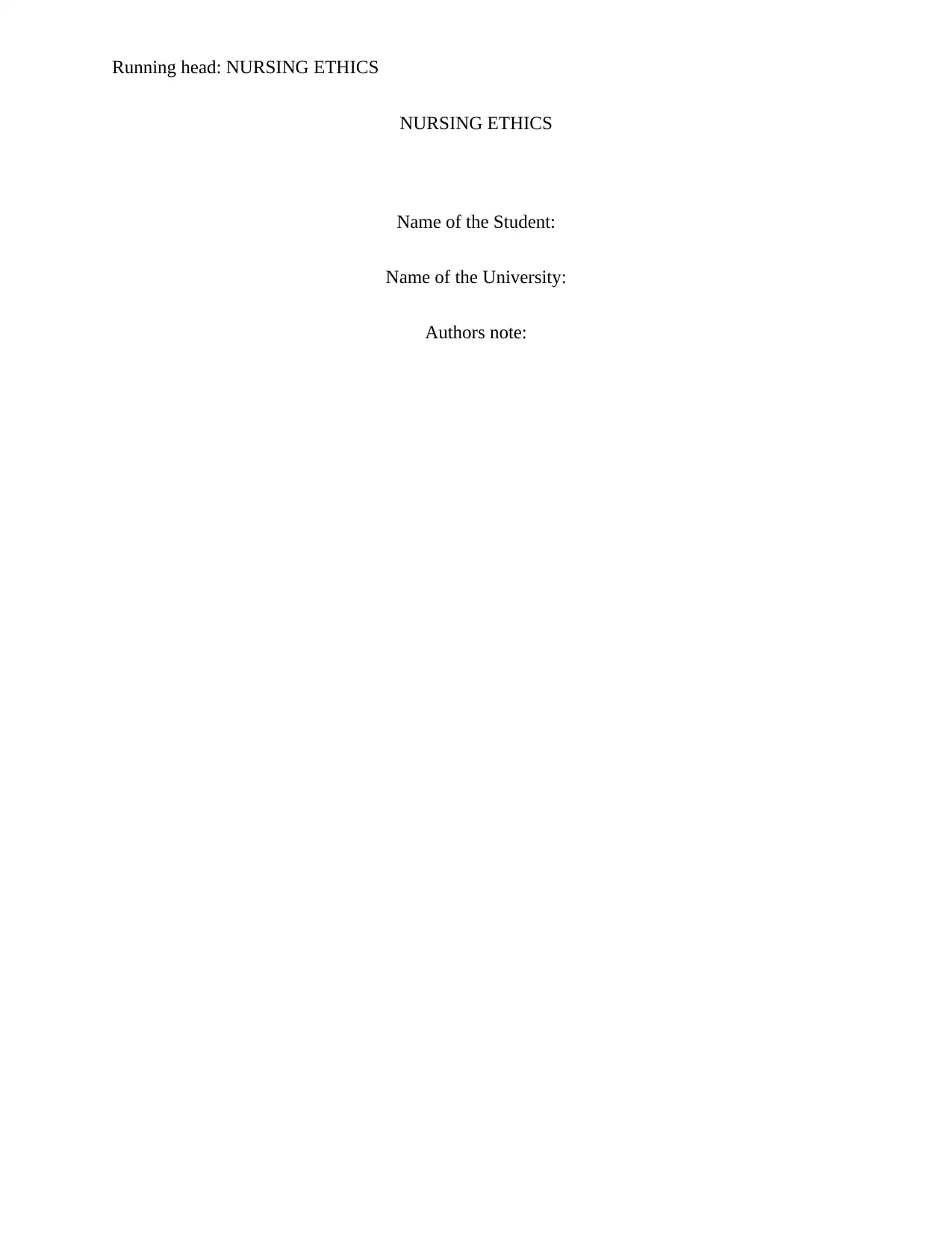
Running head: NURSING ETHICS
NURSING ETHICS
Name of the Student:
Name of the University:
Authors note:
NURSING ETHICS
Name of the Student:
Name of the University:
Authors note:
Secure Best Marks with AI Grader
Need help grading? Try our AI Grader for instant feedback on your assignments.
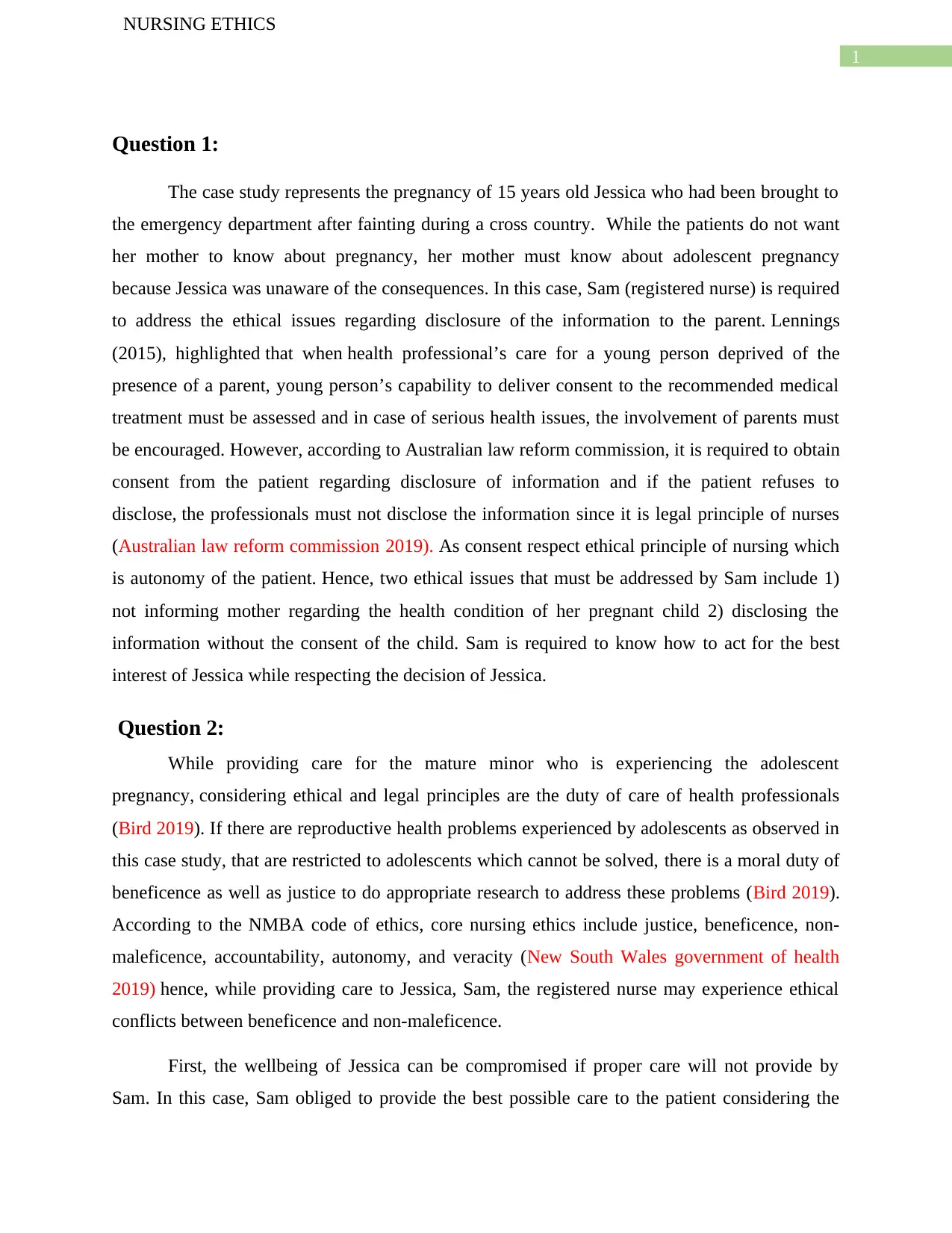
1
NURSING ETHICS
Question 1:
The case study represents the pregnancy of 15 years old Jessica who had been brought to
the emergency department after fainting during a cross country. While the patients do not want
her mother to know about pregnancy, her mother must know about adolescent pregnancy
because Jessica was unaware of the consequences. In this case, Sam (registered nurse) is required
to address the ethical issues regarding disclosure of the information to the parent. Lennings
(2015), highlighted that when health professional’s care for a young person deprived of the
presence of a parent, young person’s capability to deliver consent to the recommended medical
treatment must be assessed and in case of serious health issues, the involvement of parents must
be encouraged. However, according to Australian law reform commission, it is required to obtain
consent from the patient regarding disclosure of information and if the patient refuses to
disclose, the professionals must not disclose the information since it is legal principle of nurses
(Australian law reform commission 2019). As consent respect ethical principle of nursing which
is autonomy of the patient. Hence, two ethical issues that must be addressed by Sam include 1)
not informing mother regarding the health condition of her pregnant child 2) disclosing the
information without the consent of the child. Sam is required to know how to act for the best
interest of Jessica while respecting the decision of Jessica.
Question 2:
While providing care for the mature minor who is experiencing the adolescent
pregnancy, considering ethical and legal principles are the duty of care of health professionals
(Bird 2019). If there are reproductive health problems experienced by adolescents as observed in
this case study, that are restricted to adolescents which cannot be solved, there is a moral duty of
beneficence as well as justice to do appropriate research to address these problems (Bird 2019).
According to the NMBA code of ethics, core nursing ethics include justice, beneficence, non-
maleficence, accountability, autonomy, and veracity (New South Wales government of health
2019) hence, while providing care to Jessica, Sam, the registered nurse may experience ethical
conflicts between beneficence and non-maleficence.
First, the wellbeing of Jessica can be compromised if proper care will not provide by
Sam. In this case, Sam obliged to provide the best possible care to the patient considering the
NURSING ETHICS
Question 1:
The case study represents the pregnancy of 15 years old Jessica who had been brought to
the emergency department after fainting during a cross country. While the patients do not want
her mother to know about pregnancy, her mother must know about adolescent pregnancy
because Jessica was unaware of the consequences. In this case, Sam (registered nurse) is required
to address the ethical issues regarding disclosure of the information to the parent. Lennings
(2015), highlighted that when health professional’s care for a young person deprived of the
presence of a parent, young person’s capability to deliver consent to the recommended medical
treatment must be assessed and in case of serious health issues, the involvement of parents must
be encouraged. However, according to Australian law reform commission, it is required to obtain
consent from the patient regarding disclosure of information and if the patient refuses to
disclose, the professionals must not disclose the information since it is legal principle of nurses
(Australian law reform commission 2019). As consent respect ethical principle of nursing which
is autonomy of the patient. Hence, two ethical issues that must be addressed by Sam include 1)
not informing mother regarding the health condition of her pregnant child 2) disclosing the
information without the consent of the child. Sam is required to know how to act for the best
interest of Jessica while respecting the decision of Jessica.
Question 2:
While providing care for the mature minor who is experiencing the adolescent
pregnancy, considering ethical and legal principles are the duty of care of health professionals
(Bird 2019). If there are reproductive health problems experienced by adolescents as observed in
this case study, that are restricted to adolescents which cannot be solved, there is a moral duty of
beneficence as well as justice to do appropriate research to address these problems (Bird 2019).
According to the NMBA code of ethics, core nursing ethics include justice, beneficence, non-
maleficence, accountability, autonomy, and veracity (New South Wales government of health
2019) hence, while providing care to Jessica, Sam, the registered nurse may experience ethical
conflicts between beneficence and non-maleficence.
First, the wellbeing of Jessica can be compromised if proper care will not provide by
Sam. In this case, Sam obliged to provide the best possible care to the patient considering the
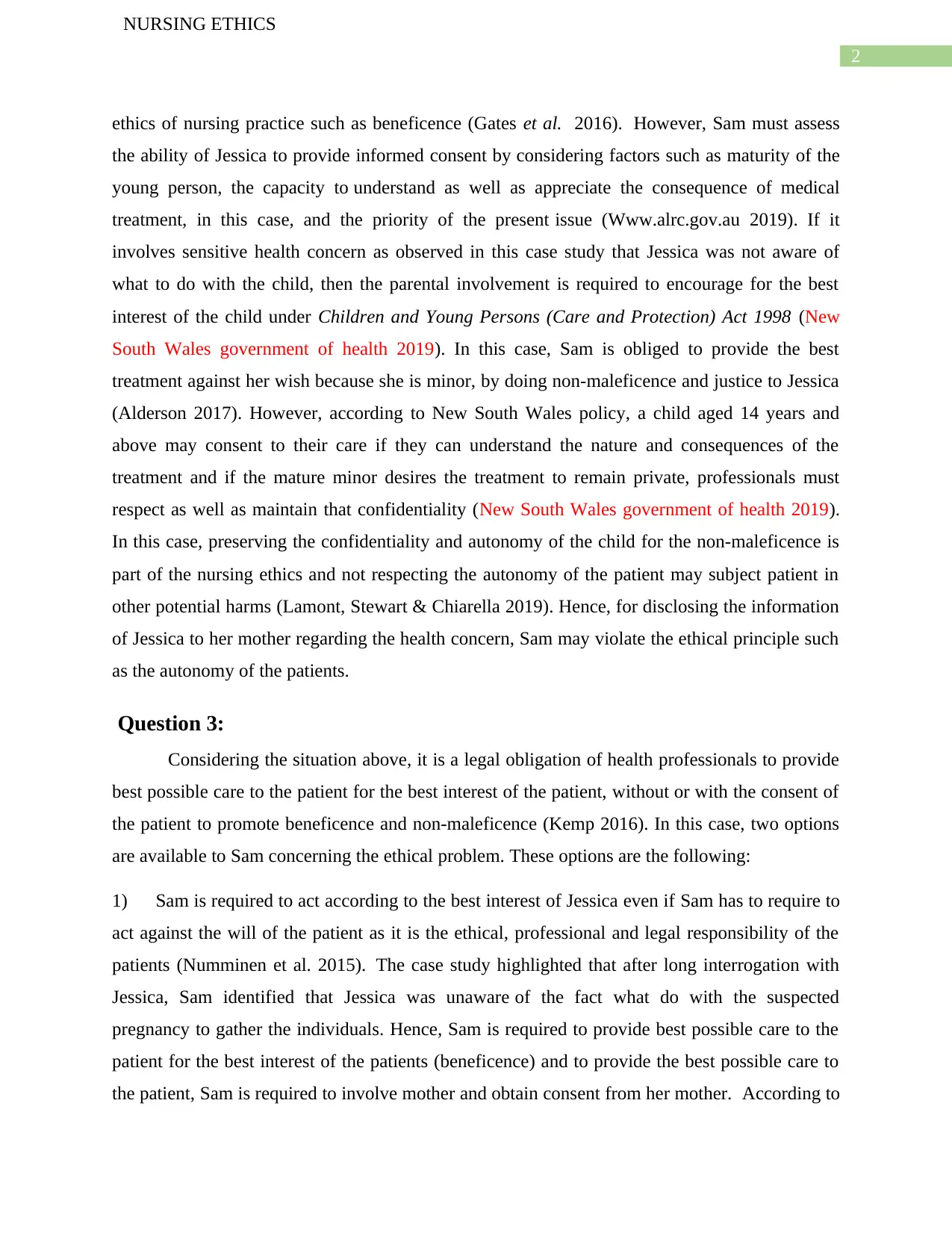
2
NURSING ETHICS
ethics of nursing practice such as beneficence (Gates et al. 2016). However, Sam must assess
the ability of Jessica to provide informed consent by considering factors such as maturity of the
young person, the capacity to understand as well as appreciate the consequence of medical
treatment, in this case, and the priority of the present issue (Www.alrc.gov.au 2019). If it
involves sensitive health concern as observed in this case study that Jessica was not aware of
what to do with the child, then the parental involvement is required to encourage for the best
interest of the child under Children and Young Persons (Care and Protection) Act 1998 (New
South Wales government of health 2019). In this case, Sam is obliged to provide the best
treatment against her wish because she is minor, by doing non-maleficence and justice to Jessica
(Alderson 2017). However, according to New South Wales policy, a child aged 14 years and
above may consent to their care if they can understand the nature and consequences of the
treatment and if the mature minor desires the treatment to remain private, professionals must
respect as well as maintain that confidentiality (New South Wales government of health 2019).
In this case, preserving the confidentiality and autonomy of the child for the non-maleficence is
part of the nursing ethics and not respecting the autonomy of the patient may subject patient in
other potential harms (Lamont, Stewart & Chiarella 2019). Hence, for disclosing the information
of Jessica to her mother regarding the health concern, Sam may violate the ethical principle such
as the autonomy of the patients.
Question 3:
Considering the situation above, it is a legal obligation of health professionals to provide
best possible care to the patient for the best interest of the patient, without or with the consent of
the patient to promote beneficence and non-maleficence (Kemp 2016). In this case, two options
are available to Sam concerning the ethical problem. These options are the following:
1) Sam is required to act according to the best interest of Jessica even if Sam has to require to
act against the will of the patient as it is the ethical, professional and legal responsibility of the
patients (Numminen et al. 2015). The case study highlighted that after long interrogation with
Jessica, Sam identified that Jessica was unaware of the fact what do with the suspected
pregnancy to gather the individuals. Hence, Sam is required to provide best possible care to the
patient for the best interest of the patients (beneficence) and to provide the best possible care to
the patient, Sam is required to involve mother and obtain consent from her mother. According to
NURSING ETHICS
ethics of nursing practice such as beneficence (Gates et al. 2016). However, Sam must assess
the ability of Jessica to provide informed consent by considering factors such as maturity of the
young person, the capacity to understand as well as appreciate the consequence of medical
treatment, in this case, and the priority of the present issue (Www.alrc.gov.au 2019). If it
involves sensitive health concern as observed in this case study that Jessica was not aware of
what to do with the child, then the parental involvement is required to encourage for the best
interest of the child under Children and Young Persons (Care and Protection) Act 1998 (New
South Wales government of health 2019). In this case, Sam is obliged to provide the best
treatment against her wish because she is minor, by doing non-maleficence and justice to Jessica
(Alderson 2017). However, according to New South Wales policy, a child aged 14 years and
above may consent to their care if they can understand the nature and consequences of the
treatment and if the mature minor desires the treatment to remain private, professionals must
respect as well as maintain that confidentiality (New South Wales government of health 2019).
In this case, preserving the confidentiality and autonomy of the child for the non-maleficence is
part of the nursing ethics and not respecting the autonomy of the patient may subject patient in
other potential harms (Lamont, Stewart & Chiarella 2019). Hence, for disclosing the information
of Jessica to her mother regarding the health concern, Sam may violate the ethical principle such
as the autonomy of the patients.
Question 3:
Considering the situation above, it is a legal obligation of health professionals to provide
best possible care to the patient for the best interest of the patient, without or with the consent of
the patient to promote beneficence and non-maleficence (Kemp 2016). In this case, two options
are available to Sam concerning the ethical problem. These options are the following:
1) Sam is required to act according to the best interest of Jessica even if Sam has to require to
act against the will of the patient as it is the ethical, professional and legal responsibility of the
patients (Numminen et al. 2015). The case study highlighted that after long interrogation with
Jessica, Sam identified that Jessica was unaware of the fact what do with the suspected
pregnancy to gather the individuals. Hence, Sam is required to provide best possible care to the
patient for the best interest of the patients (beneficence) and to provide the best possible care to
the patient, Sam is required to involve mother and obtain consent from her mother. According to
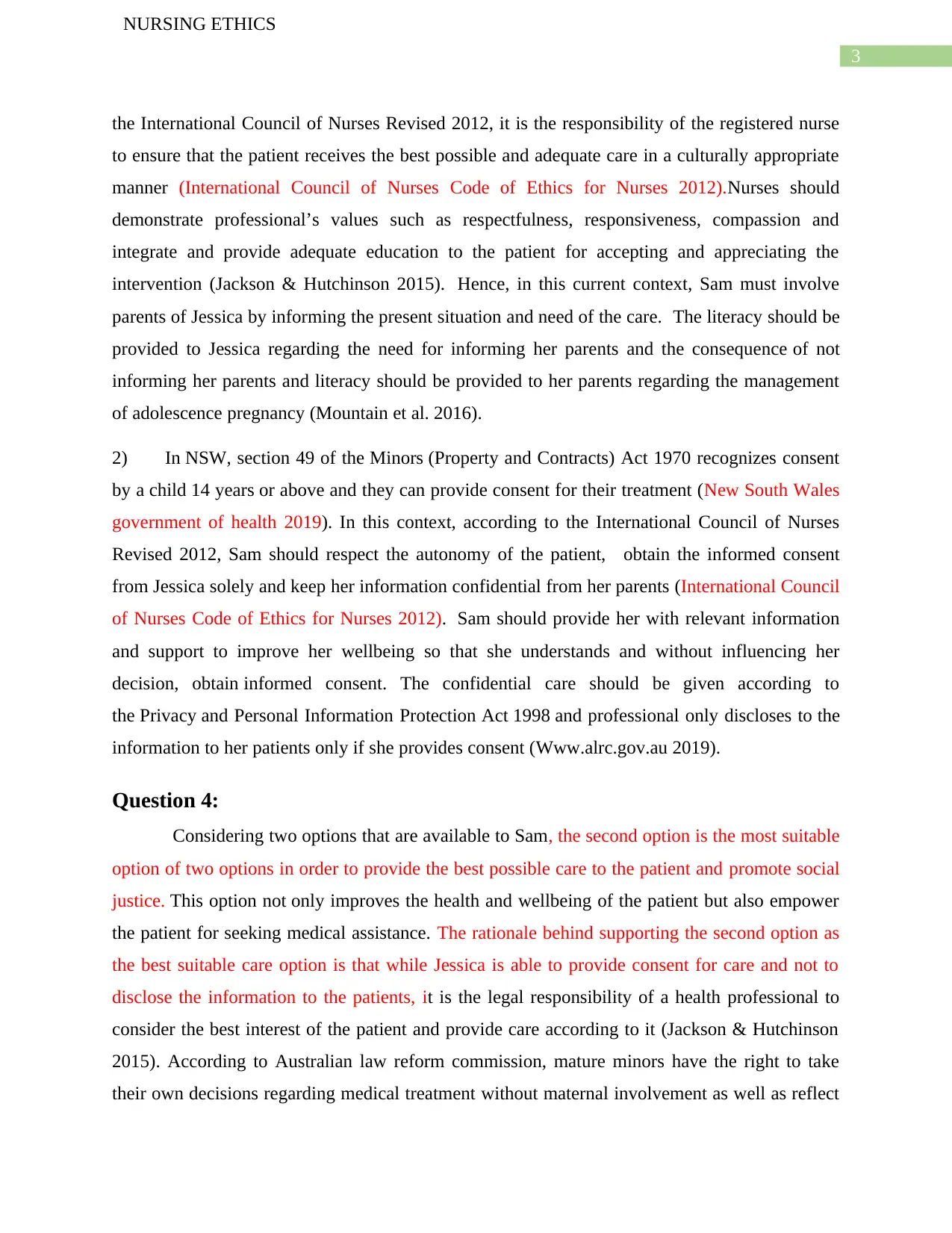
3
NURSING ETHICS
the International Council of Nurses Revised 2012, it is the responsibility of the registered nurse
to ensure that the patient receives the best possible and adequate care in a culturally appropriate
manner (International Council of Nurses Code of Ethics for Nurses 2012).Nurses should
demonstrate professional’s values such as respectfulness, responsiveness, compassion and
integrate and provide adequate education to the patient for accepting and appreciating the
intervention (Jackson & Hutchinson 2015). Hence, in this current context, Sam must involve
parents of Jessica by informing the present situation and need of the care. The literacy should be
provided to Jessica regarding the need for informing her parents and the consequence of not
informing her parents and literacy should be provided to her parents regarding the management
of adolescence pregnancy (Mountain et al. 2016).
2) In NSW, section 49 of the Minors (Property and Contracts) Act 1970 recognizes consent
by a child 14 years or above and they can provide consent for their treatment (New South Wales
government of health 2019). In this context, according to the International Council of Nurses
Revised 2012, Sam should respect the autonomy of the patient, obtain the informed consent
from Jessica solely and keep her information confidential from her parents (International Council
of Nurses Code of Ethics for Nurses 2012). Sam should provide her with relevant information
and support to improve her wellbeing so that she understands and without influencing her
decision, obtain informed consent. The confidential care should be given according to
the Privacy and Personal Information Protection Act 1998 and professional only discloses to the
information to her patients only if she provides consent (Www.alrc.gov.au 2019).
Question 4:
Considering two options that are available to Sam, the second option is the most suitable
option of two options in order to provide the best possible care to the patient and promote social
justice. This option not only improves the health and wellbeing of the patient but also empower
the patient for seeking medical assistance. The rationale behind supporting the second option as
the best suitable care option is that while Jessica is able to provide consent for care and not to
disclose the information to the patients, it is the legal responsibility of a health professional to
consider the best interest of the patient and provide care according to it (Jackson & Hutchinson
2015). According to Australian law reform commission, mature minors have the right to take
their own decisions regarding medical treatment without maternal involvement as well as reflect
NURSING ETHICS
the International Council of Nurses Revised 2012, it is the responsibility of the registered nurse
to ensure that the patient receives the best possible and adequate care in a culturally appropriate
manner (International Council of Nurses Code of Ethics for Nurses 2012).Nurses should
demonstrate professional’s values such as respectfulness, responsiveness, compassion and
integrate and provide adequate education to the patient for accepting and appreciating the
intervention (Jackson & Hutchinson 2015). Hence, in this current context, Sam must involve
parents of Jessica by informing the present situation and need of the care. The literacy should be
provided to Jessica regarding the need for informing her parents and the consequence of not
informing her parents and literacy should be provided to her parents regarding the management
of adolescence pregnancy (Mountain et al. 2016).
2) In NSW, section 49 of the Minors (Property and Contracts) Act 1970 recognizes consent
by a child 14 years or above and they can provide consent for their treatment (New South Wales
government of health 2019). In this context, according to the International Council of Nurses
Revised 2012, Sam should respect the autonomy of the patient, obtain the informed consent
from Jessica solely and keep her information confidential from her parents (International Council
of Nurses Code of Ethics for Nurses 2012). Sam should provide her with relevant information
and support to improve her wellbeing so that she understands and without influencing her
decision, obtain informed consent. The confidential care should be given according to
the Privacy and Personal Information Protection Act 1998 and professional only discloses to the
information to her patients only if she provides consent (Www.alrc.gov.au 2019).
Question 4:
Considering two options that are available to Sam, the second option is the most suitable
option of two options in order to provide the best possible care to the patient and promote social
justice. This option not only improves the health and wellbeing of the patient but also empower
the patient for seeking medical assistance. The rationale behind supporting the second option as
the best suitable care option is that while Jessica is able to provide consent for care and not to
disclose the information to the patients, it is the legal responsibility of a health professional to
consider the best interest of the patient and provide care according to it (Jackson & Hutchinson
2015). According to Australian law reform commission, mature minors have the right to take
their own decisions regarding medical treatment without maternal involvement as well as reflect
Secure Best Marks with AI Grader
Need help grading? Try our AI Grader for instant feedback on your assignments.
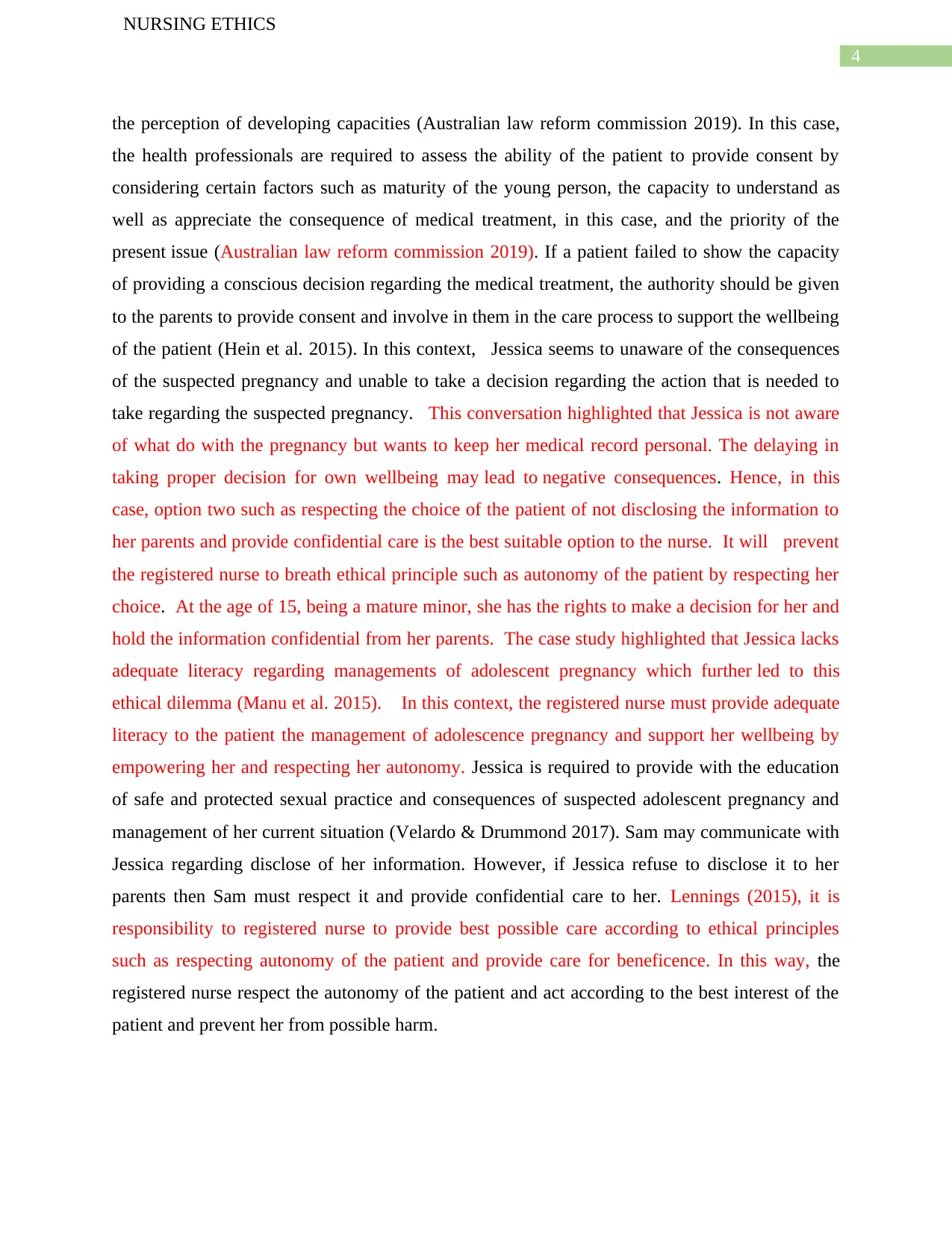
4
NURSING ETHICS
the perception of developing capacities (Australian law reform commission 2019). In this case,
the health professionals are required to assess the ability of the patient to provide consent by
considering certain factors such as maturity of the young person, the capacity to understand as
well as appreciate the consequence of medical treatment, in this case, and the priority of the
present issue (Australian law reform commission 2019). If a patient failed to show the capacity
of providing a conscious decision regarding the medical treatment, the authority should be given
to the parents to provide consent and involve in them in the care process to support the wellbeing
of the patient (Hein et al. 2015). In this context, Jessica seems to unaware of the consequences
of the suspected pregnancy and unable to take a decision regarding the action that is needed to
take regarding the suspected pregnancy. This conversation highlighted that Jessica is not aware
of what do with the pregnancy but wants to keep her medical record personal. The delaying in
taking proper decision for own wellbeing may lead to negative consequences. Hence, in this
case, option two such as respecting the choice of the patient of not disclosing the information to
her parents and provide confidential care is the best suitable option to the nurse. It will prevent
the registered nurse to breath ethical principle such as autonomy of the patient by respecting her
choice. At the age of 15, being a mature minor, she has the rights to make a decision for her and
hold the information confidential from her parents. The case study highlighted that Jessica lacks
adequate literacy regarding managements of adolescent pregnancy which further led to this
ethical dilemma (Manu et al. 2015). In this context, the registered nurse must provide adequate
literacy to the patient the management of adolescence pregnancy and support her wellbeing by
empowering her and respecting her autonomy. Jessica is required to provide with the education
of safe and protected sexual practice and consequences of suspected adolescent pregnancy and
management of her current situation (Velardo & Drummond 2017). Sam may communicate with
Jessica regarding disclose of her information. However, if Jessica refuse to disclose it to her
parents then Sam must respect it and provide confidential care to her. Lennings (2015), it is
responsibility to registered nurse to provide best possible care according to ethical principles
such as respecting autonomy of the patient and provide care for beneficence. In this way, the
registered nurse respect the autonomy of the patient and act according to the best interest of the
patient and prevent her from possible harm.
NURSING ETHICS
the perception of developing capacities (Australian law reform commission 2019). In this case,
the health professionals are required to assess the ability of the patient to provide consent by
considering certain factors such as maturity of the young person, the capacity to understand as
well as appreciate the consequence of medical treatment, in this case, and the priority of the
present issue (Australian law reform commission 2019). If a patient failed to show the capacity
of providing a conscious decision regarding the medical treatment, the authority should be given
to the parents to provide consent and involve in them in the care process to support the wellbeing
of the patient (Hein et al. 2015). In this context, Jessica seems to unaware of the consequences
of the suspected pregnancy and unable to take a decision regarding the action that is needed to
take regarding the suspected pregnancy. This conversation highlighted that Jessica is not aware
of what do with the pregnancy but wants to keep her medical record personal. The delaying in
taking proper decision for own wellbeing may lead to negative consequences. Hence, in this
case, option two such as respecting the choice of the patient of not disclosing the information to
her parents and provide confidential care is the best suitable option to the nurse. It will prevent
the registered nurse to breath ethical principle such as autonomy of the patient by respecting her
choice. At the age of 15, being a mature minor, she has the rights to make a decision for her and
hold the information confidential from her parents. The case study highlighted that Jessica lacks
adequate literacy regarding managements of adolescent pregnancy which further led to this
ethical dilemma (Manu et al. 2015). In this context, the registered nurse must provide adequate
literacy to the patient the management of adolescence pregnancy and support her wellbeing by
empowering her and respecting her autonomy. Jessica is required to provide with the education
of safe and protected sexual practice and consequences of suspected adolescent pregnancy and
management of her current situation (Velardo & Drummond 2017). Sam may communicate with
Jessica regarding disclose of her information. However, if Jessica refuse to disclose it to her
parents then Sam must respect it and provide confidential care to her. Lennings (2015), it is
responsibility to registered nurse to provide best possible care according to ethical principles
such as respecting autonomy of the patient and provide care for beneficence. In this way, the
registered nurse respect the autonomy of the patient and act according to the best interest of the
patient and prevent her from possible harm.
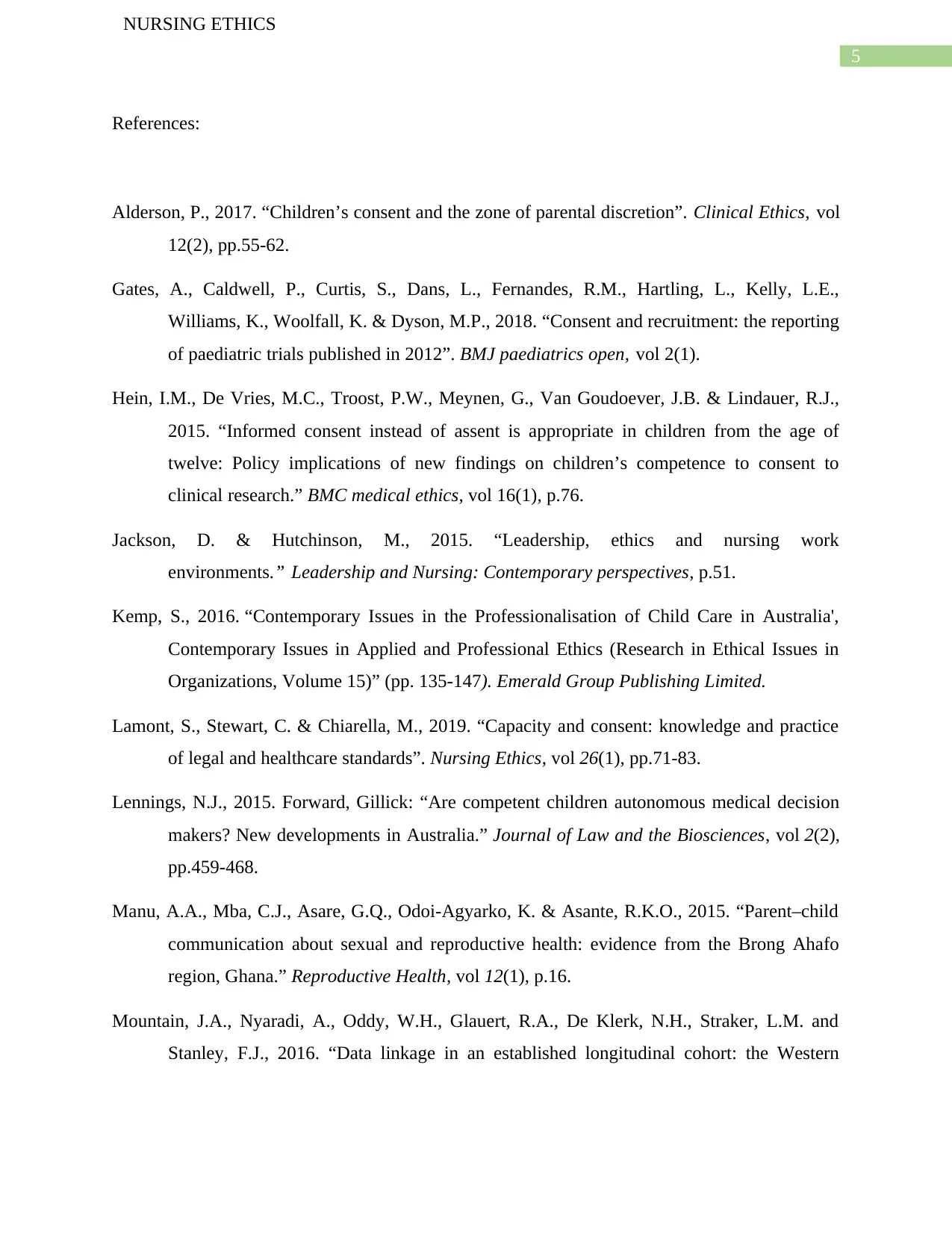
5
NURSING ETHICS
References:
Alderson, P., 2017. “Children’s consent and the zone of parental discretion”. Clinical Ethics, vol
12(2), pp.55-62.
Gates, A., Caldwell, P., Curtis, S., Dans, L., Fernandes, R.M., Hartling, L., Kelly, L.E.,
Williams, K., Woolfall, K. & Dyson, M.P., 2018. “Consent and recruitment: the reporting
of paediatric trials published in 2012”. BMJ paediatrics open, vol 2(1).
Hein, I.M., De Vries, M.C., Troost, P.W., Meynen, G., Van Goudoever, J.B. & Lindauer, R.J.,
2015. “Informed consent instead of assent is appropriate in children from the age of
twelve: Policy implications of new findings on children’s competence to consent to
clinical research.” BMC medical ethics, vol 16(1), p.76.
Jackson, D. & Hutchinson, M., 2015. “Leadership, ethics and nursing work
environments.” Leadership and Nursing: Contemporary perspectives, p.51.
Kemp, S., 2016. “Contemporary Issues in the Professionalisation of Child Care in Australia',
Contemporary Issues in Applied and Professional Ethics (Research in Ethical Issues in
Organizations, Volume 15)” (pp. 135-147). Emerald Group Publishing Limited.
Lamont, S., Stewart, C. & Chiarella, M., 2019. “Capacity and consent: knowledge and practice
of legal and healthcare standards”. Nursing Ethics, vol 26(1), pp.71-83.
Lennings, N.J., 2015. Forward, Gillick: “Are competent children autonomous medical decision
makers? New developments in Australia.” Journal of Law and the Biosciences, vol 2(2),
pp.459-468.
Manu, A.A., Mba, C.J., Asare, G.Q., Odoi-Agyarko, K. & Asante, R.K.O., 2015. “Parent–child
communication about sexual and reproductive health: evidence from the Brong Ahafo
region, Ghana.” Reproductive Health, vol 12(1), p.16.
Mountain, J.A., Nyaradi, A., Oddy, W.H., Glauert, R.A., De Klerk, N.H., Straker, L.M. and
Stanley, F.J., 2016. “Data linkage in an established longitudinal cohort: the Western
NURSING ETHICS
References:
Alderson, P., 2017. “Children’s consent and the zone of parental discretion”. Clinical Ethics, vol
12(2), pp.55-62.
Gates, A., Caldwell, P., Curtis, S., Dans, L., Fernandes, R.M., Hartling, L., Kelly, L.E.,
Williams, K., Woolfall, K. & Dyson, M.P., 2018. “Consent and recruitment: the reporting
of paediatric trials published in 2012”. BMJ paediatrics open, vol 2(1).
Hein, I.M., De Vries, M.C., Troost, P.W., Meynen, G., Van Goudoever, J.B. & Lindauer, R.J.,
2015. “Informed consent instead of assent is appropriate in children from the age of
twelve: Policy implications of new findings on children’s competence to consent to
clinical research.” BMC medical ethics, vol 16(1), p.76.
Jackson, D. & Hutchinson, M., 2015. “Leadership, ethics and nursing work
environments.” Leadership and Nursing: Contemporary perspectives, p.51.
Kemp, S., 2016. “Contemporary Issues in the Professionalisation of Child Care in Australia',
Contemporary Issues in Applied and Professional Ethics (Research in Ethical Issues in
Organizations, Volume 15)” (pp. 135-147). Emerald Group Publishing Limited.
Lamont, S., Stewart, C. & Chiarella, M., 2019. “Capacity and consent: knowledge and practice
of legal and healthcare standards”. Nursing Ethics, vol 26(1), pp.71-83.
Lennings, N.J., 2015. Forward, Gillick: “Are competent children autonomous medical decision
makers? New developments in Australia.” Journal of Law and the Biosciences, vol 2(2),
pp.459-468.
Manu, A.A., Mba, C.J., Asare, G.Q., Odoi-Agyarko, K. & Asante, R.K.O., 2015. “Parent–child
communication about sexual and reproductive health: evidence from the Brong Ahafo
region, Ghana.” Reproductive Health, vol 12(1), p.16.
Mountain, J.A., Nyaradi, A., Oddy, W.H., Glauert, R.A., De Klerk, N.H., Straker, L.M. and
Stanley, F.J., 2016. “Data linkage in an established longitudinal cohort: the Western
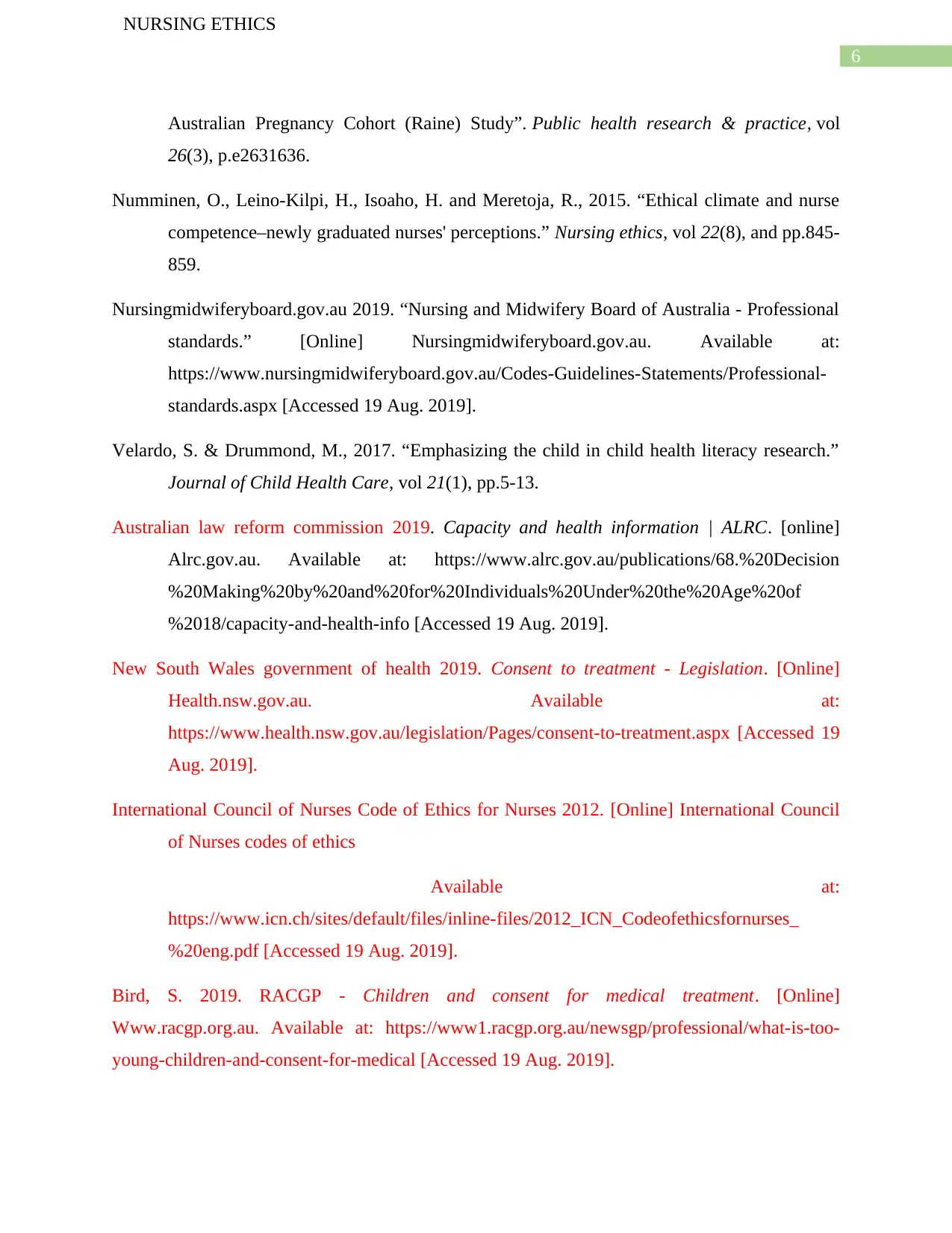
6
NURSING ETHICS
Australian Pregnancy Cohort (Raine) Study”. Public health research & practice, vol
26(3), p.e2631636.
Numminen, O., Leino-Kilpi, H., Isoaho, H. and Meretoja, R., 2015. “Ethical climate and nurse
competence–newly graduated nurses' perceptions.” Nursing ethics, vol 22(8), and pp.845-
859.
Nursingmidwiferyboard.gov.au 2019. “Nursing and Midwifery Board of Australia - Professional
standards.” [Online] Nursingmidwiferyboard.gov.au. Available at:
https://www.nursingmidwiferyboard.gov.au/Codes-Guidelines-Statements/Professional-
standards.aspx [Accessed 19 Aug. 2019].
Velardo, S. & Drummond, M., 2017. “Emphasizing the child in child health literacy research.”
Journal of Child Health Care, vol 21(1), pp.5-13.
Australian law reform commission 2019. Capacity and health information | ALRC. [online]
Alrc.gov.au. Available at: https://www.alrc.gov.au/publications/68.%20Decision
%20Making%20by%20and%20for%20Individuals%20Under%20the%20Age%20of
%2018/capacity-and-health-info [Accessed 19 Aug. 2019].
New South Wales government of health 2019. Consent to treatment - Legislation. [Online]
Health.nsw.gov.au. Available at:
https://www.health.nsw.gov.au/legislation/Pages/consent-to-treatment.aspx [Accessed 19
Aug. 2019].
International Council of Nurses Code of Ethics for Nurses 2012. [Online] International Council
of Nurses codes of ethics
Available at:
https://www.icn.ch/sites/default/files/inline-files/2012_ICN_Codeofethicsfornurses_
%20eng.pdf [Accessed 19 Aug. 2019].
Bird, S. 2019. RACGP - Children and consent for medical treatment. [Online]
Www.racgp.org.au. Available at: https://www1.racgp.org.au/newsgp/professional/what-is-too-
young-children-and-consent-for-medical [Accessed 19 Aug. 2019].
NURSING ETHICS
Australian Pregnancy Cohort (Raine) Study”. Public health research & practice, vol
26(3), p.e2631636.
Numminen, O., Leino-Kilpi, H., Isoaho, H. and Meretoja, R., 2015. “Ethical climate and nurse
competence–newly graduated nurses' perceptions.” Nursing ethics, vol 22(8), and pp.845-
859.
Nursingmidwiferyboard.gov.au 2019. “Nursing and Midwifery Board of Australia - Professional
standards.” [Online] Nursingmidwiferyboard.gov.au. Available at:
https://www.nursingmidwiferyboard.gov.au/Codes-Guidelines-Statements/Professional-
standards.aspx [Accessed 19 Aug. 2019].
Velardo, S. & Drummond, M., 2017. “Emphasizing the child in child health literacy research.”
Journal of Child Health Care, vol 21(1), pp.5-13.
Australian law reform commission 2019. Capacity and health information | ALRC. [online]
Alrc.gov.au. Available at: https://www.alrc.gov.au/publications/68.%20Decision
%20Making%20by%20and%20for%20Individuals%20Under%20the%20Age%20of
%2018/capacity-and-health-info [Accessed 19 Aug. 2019].
New South Wales government of health 2019. Consent to treatment - Legislation. [Online]
Health.nsw.gov.au. Available at:
https://www.health.nsw.gov.au/legislation/Pages/consent-to-treatment.aspx [Accessed 19
Aug. 2019].
International Council of Nurses Code of Ethics for Nurses 2012. [Online] International Council
of Nurses codes of ethics
Available at:
https://www.icn.ch/sites/default/files/inline-files/2012_ICN_Codeofethicsfornurses_
%20eng.pdf [Accessed 19 Aug. 2019].
Bird, S. 2019. RACGP - Children and consent for medical treatment. [Online]
Www.racgp.org.au. Available at: https://www1.racgp.org.au/newsgp/professional/what-is-too-
young-children-and-consent-for-medical [Accessed 19 Aug. 2019].
1 out of 7
Related Documents
Your All-in-One AI-Powered Toolkit for Academic Success.
+13062052269
info@desklib.com
Available 24*7 on WhatsApp / Email
![[object Object]](/_next/static/media/star-bottom.7253800d.svg)
Unlock your academic potential
© 2024 | Zucol Services PVT LTD | All rights reserved.




